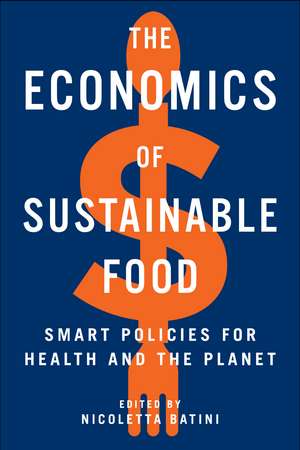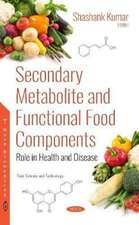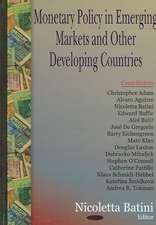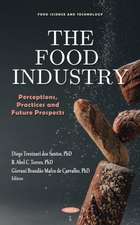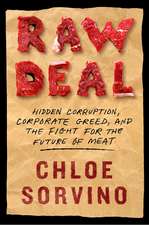The Economics of Sustainable Food: Smart Policies for Health and the Planet
Editat de Nicoletta Batinien Limba Engleză Paperback – 7 iun 2021
Producing food industrially like we do today causes tremendous global economic losses in terms of malnutrition, diseases, and environmental degradation. But because the food industry does not bear those costs and the price tag for these losses does not show up at the grocery store, it is too often ignored by economists and policymakers.
The Economics of Sustainable Food details the true cost of food for people and the planet. It illustrates how to transform our broken system, alleviating its severe financial and human burden. The key is smart macroeconomic policy that moves us toward methods that protect the environment like regenerative land and sea farming, low-impact urban farming, and alternative protein farming, and toward healthy diets. The book’s multidisciplinary team of authors lay out detailed fiscal and trade policies, as well as structural reforms, to achieve those goals.
Chapters discuss strategies to make food production sustainable, nutritious, and fair, ranging from taxes and spending to education, labor market, health care, and pension reforms, alongside regulation in cases where market incentives are unlikely to work or to work fast enough. The authors carefully consider the different needs of more and less advanced economies, balancing economic development and sustainability goals. Case studies showcase successful strategies from around the world, such as taxing foods with a high carbon footprint, financing ecosystems mapping and conservation to meet scientific targets for healthy biomes permanency, subsidizing sustainable land and sea farming, reforming health systems to move away from sick care to preventive, nutrition-based care, and providing schools with matching funds to purchase local organic produce.
In the years ahead, few issues will be more important for individual prosperity and the global economy than the way we produce our food and what food we eat. This roadmap for reform is an invaluable resource to help global policymakers improve countless lives.
The Economics of Sustainable Food details the true cost of food for people and the planet. It illustrates how to transform our broken system, alleviating its severe financial and human burden. The key is smart macroeconomic policy that moves us toward methods that protect the environment like regenerative land and sea farming, low-impact urban farming, and alternative protein farming, and toward healthy diets. The book’s multidisciplinary team of authors lay out detailed fiscal and trade policies, as well as structural reforms, to achieve those goals.
Chapters discuss strategies to make food production sustainable, nutritious, and fair, ranging from taxes and spending to education, labor market, health care, and pension reforms, alongside regulation in cases where market incentives are unlikely to work or to work fast enough. The authors carefully consider the different needs of more and less advanced economies, balancing economic development and sustainability goals. Case studies showcase successful strategies from around the world, such as taxing foods with a high carbon footprint, financing ecosystems mapping and conservation to meet scientific targets for healthy biomes permanency, subsidizing sustainable land and sea farming, reforming health systems to move away from sick care to preventive, nutrition-based care, and providing schools with matching funds to purchase local organic produce.
In the years ahead, few issues will be more important for individual prosperity and the global economy than the way we produce our food and what food we eat. This roadmap for reform is an invaluable resource to help global policymakers improve countless lives.
Preț: 261.04 lei
Nou
Puncte Express: 392
Preț estimativ în valută:
49.96€ • 51.96$ • 41.24£
49.96€ • 51.96$ • 41.24£
Carte disponibilă
Livrare economică 24 martie-07 aprilie
Livrare express 07-13 martie pentru 37.16 lei
Preluare comenzi: 021 569.72.76
Specificații
ISBN-13: 9781642831610
ISBN-10: 1642831611
Pagini: 320
Ilustrații: 38 illustrations
Dimensiuni: 152 x 229 x 23 mm
Greutate: 0.5 kg
Editura: Island Press
Colecția Island Press
ISBN-10: 1642831611
Pagini: 320
Ilustrații: 38 illustrations
Dimensiuni: 152 x 229 x 23 mm
Greutate: 0.5 kg
Editura: Island Press
Colecția Island Press
Notă biografică
Nicoletta Batini is a scholar of innovative monetary and fiscal policy and is a leading expert in the design of macroeconomic strategies to deal with the climate change/public health nexus. Prior to joining the International Monetary Fund’s Independent Evaluation Office, she was Advisor of the Bank of England’s Monetary Policy Committee, Professor of Economics at the University of Surrey, and Director of the International Economics and Policy Office of the Treasury in Italy.
Cuprins
Preface \ Nicoletta Batini
Chapter 1. We Depend on Food, Food Depends on Nature \ Nicoletta Batini
Part I. Greening Food Supply
Chapter 2. Greening Food Supply in Advanced Economies \ Nicoletta Batini and Philippe Pointereau
Chapter 3. Greening Food Supply in Less-Advanced Economies \ Ruth De Fries
Chapter 4. Sustainable Farming Trends
a. Small and Polyfunctional Farming \ John Ikerd, Patty Cantrell, Hanna Wernerson
b. Urban, Vertical, Controlled-Environment Farming \ Dickson Despommier and Charles Knirsch
c. Regenerative Ocean Farming \ Nicoletta Batini and Bren Smith
d. Alternative Protein Farming \ Bruce Friedrich and Stephen R. Kaufman
Part II. Greening Food Demand
Chapter 5. Greening Food Demand in Advanced Economies \ Nicoletta Batini and Luigi Fontana
Chapter 6. Greening Food Demand in Less-Advanced Economies \ Divya Mehra, Saskia de Pee, Jessica C. Fanzo, Martin W. Bloem
Part III. Greening Food Waste
Chapter 7. Eliminating Food Waste \ Geeta Sethi, Emilie Cassou, Lucia Patricia Avila Bedregal, Catherine "Simmy" Jain, Dipti Thapa, Xiaoyue Hou, and Luis Constantino
Part IV. Conserving Land and Sea to Support Food Security
Chapter 8. Conserving Land and Forests \ Nicoletta Batini
Chapter 9. Conserving the Oceans \ Nicoletta Batini and Rodolfo Werner
Chapter 10. Conserving Mammals \ Ivon Cuadros-Casanova and Carlo Rondinini
Chapter 11. Conserving Insects \ Michael J. Samways, Pedro Cardoso and Charl Deacon
Chapter 12. Conclusions \ Nicolette Batini
Acknowledgments
Contributors
Index
Chapter 1. We Depend on Food, Food Depends on Nature \ Nicoletta Batini
Part I. Greening Food Supply
Chapter 2. Greening Food Supply in Advanced Economies \ Nicoletta Batini and Philippe Pointereau
Chapter 3. Greening Food Supply in Less-Advanced Economies \ Ruth De Fries
Chapter 4. Sustainable Farming Trends
a. Small and Polyfunctional Farming \ John Ikerd, Patty Cantrell, Hanna Wernerson
b. Urban, Vertical, Controlled-Environment Farming \ Dickson Despommier and Charles Knirsch
c. Regenerative Ocean Farming \ Nicoletta Batini and Bren Smith
d. Alternative Protein Farming \ Bruce Friedrich and Stephen R. Kaufman
Part II. Greening Food Demand
Chapter 5. Greening Food Demand in Advanced Economies \ Nicoletta Batini and Luigi Fontana
Chapter 6. Greening Food Demand in Less-Advanced Economies \ Divya Mehra, Saskia de Pee, Jessica C. Fanzo, Martin W. Bloem
Part III. Greening Food Waste
Chapter 7. Eliminating Food Waste \ Geeta Sethi, Emilie Cassou, Lucia Patricia Avila Bedregal, Catherine "Simmy" Jain, Dipti Thapa, Xiaoyue Hou, and Luis Constantino
Part IV. Conserving Land and Sea to Support Food Security
Chapter 8. Conserving Land and Forests \ Nicoletta Batini
Chapter 9. Conserving the Oceans \ Nicoletta Batini and Rodolfo Werner
Chapter 10. Conserving Mammals \ Ivon Cuadros-Casanova and Carlo Rondinini
Chapter 11. Conserving Insects \ Michael J. Samways, Pedro Cardoso and Charl Deacon
Chapter 12. Conclusions \ Nicolette Batini
Acknowledgments
Contributors
Index
Recenzii
"This volume is a must-read for policy-makers and development practitioners in all parts of the world. Food system sustainability is key to protecting human health, ending poverty, fighting climate change, and protecting biodiversity. The essays, by global leaders in nutrition, agronomy, finance, and other disciplines, provide a comprehensive, cutting-edge, and policy-oriented roadmap for success."
"There simply will be no sustainable future for humanity without a food and land use trajectory compatible with the conditions which nurtured the rise of human civilization. Written in clear and accessible language, The Economics of Sustainable Food should be required reading for national leaders, Ministers of Finance and Planning, and all involved in agriculture. A major contribution."
"Modern food systems are destroying both human and planetary health, but sustainable alternatives that enhance wellbeing are possible. Batini's book vividly describes these challenges and calls on economists to forge this urgent transition; I deeply hope this is heard as the future of human civilization is at stake."
"At the IMF, we have supported carbon pricing and green investment as key tools to fight climate change. This valuable book highlights important issues macroeconomists often overlook—that reforming global food systems and land use can play a critical role in preserving the health of our planet, population, and economies."
Descriere
Producing food industrially like we do today causes tremendous global economic losses in terms of malnutrition, diseases, and environmental degradation. But because the food industry does not bear those costs and the price tag for these losses does not show up at the grocery store, it is too often ignored by economists and policymakers.
The Economics of Sustainable Food details the true cost of food for people and the planet. It illustrates how to transform our broken system, alleviating its severe financial and human burden. The key is smart macroeconomic policy that moves us toward methods that protect the environment like regenerative land and sea farming, low-impact urban farming, and alternative protein farming, and toward healthy diets. The book’s multidisciplinary team of authors lay out detailed fiscal and trade policies, as well as structural reforms, to achieve those goals.
The Economics of Sustainable Food details the true cost of food for people and the planet. It illustrates how to transform our broken system, alleviating its severe financial and human burden. The key is smart macroeconomic policy that moves us toward methods that protect the environment like regenerative land and sea farming, low-impact urban farming, and alternative protein farming, and toward healthy diets. The book’s multidisciplinary team of authors lay out detailed fiscal and trade policies, as well as structural reforms, to achieve those goals.
